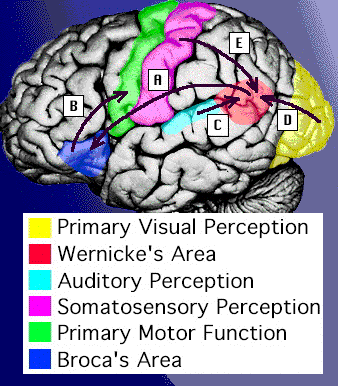You’ve probably heard this before: The human brain is one of the most complex objects in the Universe. It’s responsible for so many actions inside of us, and these actions have shaped the world as we know it. Even the smallest things, like watching the sunrise or knowing when it’s time to eat, require so many steps.
The same is true when it comes to freestyle rap.
You’re probably thinking, What? How on earth did you get there?
It took a few steps.
When it comes to anything involving language — talking, listening, reading, and writing — your brain relies heavily on two areas in the left hemisphere (the Wernicke’s area and the Broca’s area).
The Wernicke’s area helps you understand language. It takes input from the visual cortex (from reading) and the auditory cortex (through listening) and “translates” these waves and squiggles into words that you can understand.
The Broca’s area is responsible for helping you produce speech, whether that be through speaking or writing. It sends signals to your motor and sensory cortices so that you will be able to move your mouth and tongue (or your hands if you’re writing) to form the words that you want to say, with the correct grammar and syntax [1].
So that’s language. What about music? Evidence shows that different aspects of music — such as differentiating between pitch, harmony, and rhythm — utilize both the left and right hemispheres, but for different purposes. For instance, being able to determine different notes and chords relies on areas in the right hemisphere. But when it comes to rhythm, both hemisphere are used... the left hemisphere in smaller bits of music, and the right hemisphere in longer ones. There is still a lot that we need to learn [2].
Now, where does freestyle rap come into play?
If you’ve ever listened to a freestyle rap battle (and if you haven’t, I recommend you ask Google for help), you would know that it requires a very unique skill set. Freestyle rappers have to fit every word that comes out of their mouth in a way that lines up with background music. On the fly. This is not an easy feat, especially considering that many of the best utilize a wide range of vocabulary.
And that got me thinking, what exactly goes on inside their heads?
I looked this up, and it turns out there was a study done in 2012 by Liu et. al. that helps us come to an answer to this question. The study was meant to be an analysis of how creative thought occurs in the brain, and Liu et. al. thought that freestyle rap was one of the most effective and efficient ways to be able to view this process under a functional magnetic resonance imaging (fMRI) machine.
During the study, participants (who were professional freestyle rappers) were asked to perform a rehearsed piece and an improvised piece, and the two different scans were compared. What Liu et. al. found out was that between improvisation and rehearsing, there was an increase of activity in the medial prefrontal cortex (MPFC), particularly in the left hemisphere. This was accompanied by increases in activity in temporal gyri (which are responsible for language processing), the amygdala (which regulates your fight-or-flight response), the fusiform gyrus (which is responsible for word recognition), and motor cortices. However, there was a decrease in activity in the dorsolateral prefrontal cortex (DLPFC), especially in the right hemisphere [3].
What does this all mean?
The medial prefrontal cortex (MPFC) is thought to be responsible for “social functions.” Meanwhile, the dorsolateral prefrontal cortex (DLPFC) is responsible for more rote functions: particularly focus, memorization, and comprehension.
When the MPFC increases in activity in conjunction with different gyri and the amygdala along with decreasing activity in the DLPFC, the brain goes into a “flow state” in which the brain is more driven to think diffusely than to take time to actively comprehend information. This decreases the amount of time it takes for signals that are first taken in from the auditory cortices to ultimately reach the motor cortex [3], [4].
In short, this study gives us some insight into why freestyle rapping is so difficult yet seemingly effortless. Freestyle rappers have to be able to put on a show, but everything is being given to them on the spot, so they don’t have time to mull things over. Instead, their brains have to work efficiently enough so that they can take music and given information in and put relevant phrases out. As a result, they have to be able to bypass taking time to internalize and develop a response. This means that the freestyle rapper would already have to be very familiar with performing in this particular style, and they would have to have a wide lexicon that they would be able to easily retrieve.
This is just one study, but it’s one step further into showing us how our brains act in unique situations.
So there you have it: Freestyle rapping is not easy!
And with that, we'll close off in the most appropriate way possible.
* * *
[1] “The Power of Babble: The Evolution of Language.” The Tell-Tale Brain: a Neuroscientist's Quest for What Makes Us Human, by V. S. Ramachandran, W.W. Norton, 2012, pp. 153–176.
[2] Norman M. Weinberger. “Music and the Brain” https://www.scientificamerican.com/article/music-and-the-brain-2006-09/
[3] Liu et. al. “Neural Correlates of Lyrical Improvisation: An fMRI Study of Freestyle Rap” https://www.nature.com/articles/srep00834
[4]Arne Dietrich. “The Neuroscience Lessons of Freestyle Rap” https://www.scientificamerican.com/article/the-neuroscience-lessons-of-freestyle-rap/



















